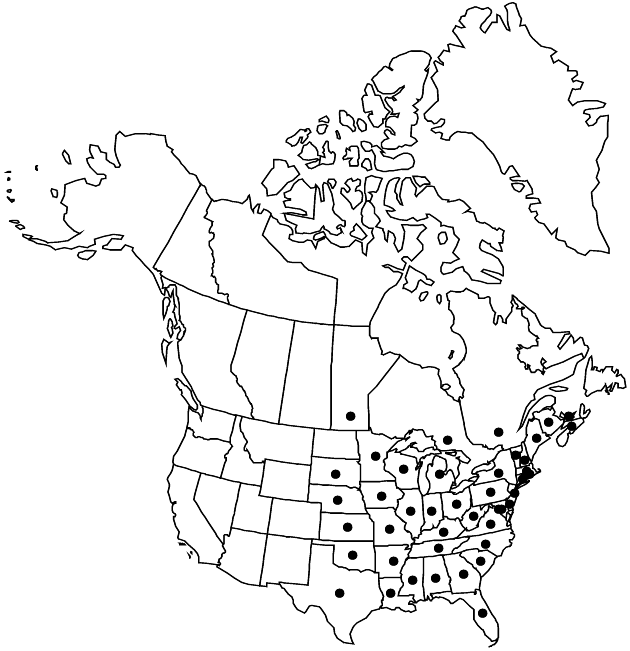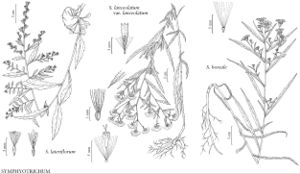Symphyotrichum lateriflorum
Taxon 31: 359. 1982.
Perennials, 20–120 (–150) cm, cespitose; with short, woody, branched caudices, or short-rhizomatous. Stems 1–5+, ascending to erect (± arching, slender, brittle), ± densely pilose or villous to glabrate or glabrous (particularly proximally). Leaves thin, membranous, margins serrate to serrulate, scabridulous, apices acute to acuminate, sometimes caudate, mucronulate, abaxial faces glabrous, midveins usually ± densely pilose to glabrate, rarely glabrous, adaxial scabrous (short-strigose) to glabrate; basal usually withering by flowering, sometimes persisting (new vernal rosettes often developing at flowering), petiolate to subpetiolate (petioles narrowly to ± broadly winged, ciliate, bases ± sheathing), blades oblanceolate, lanceovate or ovate to spatulate or suborbiculate, 5–35 × 7–25 mm, abruptly attenuate, margins crenate-serrate, apices obtuse to rounded or acute; proximal cauline mostly withering by flowering, sessile or subpetiolate (petioles broadly winged), blades usually ovate or elliptic to elliptic-oblanceolate or lanceolate, rarely linear-lanceolate, (30–) 50–100 (–150) × (2–) 10–20 (–35) mm, greatly reduced distally, bases attenuate to cuneate; distal sessile, blades ovate, lanceovate, lance-elliptic, or oblanceolate to lance-linear or linear, 10–150 × 1–30 mm, progressively reduced distally, branch leaves abruptly smaller, bases cuneate, margins sometimes entire. Heads in ample, open, diffuse, ± pyramidal, paniculiform arrays, branches divaricate to long-arching or ± ascending, slender, wiry, secund; usually sessile, sometimes peduncles 0.1–1 cm+, ± pilose, bracts 1–7, linear or subulate to oblong-lanceolate, foliaceous, grading into phyllaries. Involucres cylindro-campanulate, (3.5–) 4–6 (–7) mm. Phyllaries in 3–4 (–6) series, appressed or slightly spreading, oblong-lanceolate or -oblanceoalte (outer) to linear (inner), unequal, bases indurate 1/3–2/3, margins scarious, erose, hyaline or sometimes reddish, ± ciliolate, green zones lanceolate to ± diamond-shaped, apices (outer) acute, callus-pointed, (mid) acute to acuminate, or obtuse, sometimes purplish, abaxial faces glabrous (outer), mid sparsely puberulent. Ray-florets 8–15 (–23); corollas white, rarely pinkish or purplish, laminae (3–) 4–5 (–8) × 0.9–1.2 mm. Disc-florets 8–16 (–20); corollas cream to light yellow turning pink or reddish purple, (2.5–) 3–5 mm, tubes shorter than funnelform-campanulate throats, lobes strongly reflexed, lanceolate, 0.9–1.7 mm. Cypselae gray or tan, oblong-obovoid, sometimes ± compressed, (1.3–) 1.8–2.2 mm, 3–5-nerved, faces sparsely strigillose; pappi white to pinkish, 3–4 mm. 2n = 16, 32, 48.
Phenology: Flowering Aug–Oct.
Habitat: Relatively shaded habitats, dry to humid soils, usually deciduous woodlands (beech–maple, oak–hickory, mixed hardwoods), sometimes conifer woods, sometimes swamp forests (conifer or dediduous), edges of woods, meadows, usually rocky or sandy stream and pond shores, roadsides
Elevation: 0–400 m
Distribution

Man., N.B., N.S., Ont., P.E.I., Que., Ala., Ark., Conn., Del., D.C., Fla., Ga., Ill., Ind., Iowa, Kans., Ky., La., Maine, Md., Mass., Mich., Minn., Miss., Mo., Nebr., N.H., N.J., N.Y., N.C., Ohio, Okla., Pa., R.I., S.C., S.Dak., Tenn., Tex., Vt., Va., W.Va., Wis.
Discussion
Symphyotrichum lateriflorum has been reported in British Columbia as an ephemeral that did not persist. G. L. Nesom (1994b) and J. C. Semple et al. (2002) recognized several varieties within the complex: var. lateriflorum (syn. Aster vimineus Lamarck); var. angustifolium (Wiegand) G. L. Nesom (syn. A. lateriflorus var. angustifolius Wiegand); var. flagellare (Shinners) G. L. Nesom (syn. A. lateriflorus var. flagellaris Shinners, A. lateriflorus var. indutus Shinners); var. hirsuticaule (Lindley ex de Candolle) G. L. Nesom [syn. A. hirsuticaulis Lindley ex de Candolle, A. lateriflorus var. hirsuticaulis (Lindley ex de Candolle) Porter]; var. horizontale (Desfontaines) G. L. Nesom [syn. A. horizontalis Desfontaines, A. lateriflorus var. horizontalis (Desfontaines) Farwell]; var. spatelliforme (E. S. Burgess) G. L. Nesom [syn. A. spatelliformis E. S. Burgess, A. lateriflorus var. spatelliformis (E. S. Burgess) A. G. Jones]; and var. tenuipes (Wiegand) G. L. Nesom (syn. A. lateriflorus var. tenuipes Wiegand, A. acadiensis Shinners). Much genetic and phenotypic variation is encountered within the complex; a thorough study is needed before a coherent taxonomy can be achieved.
Selected References
None.
Lower Taxa
"thin" is not a number.
